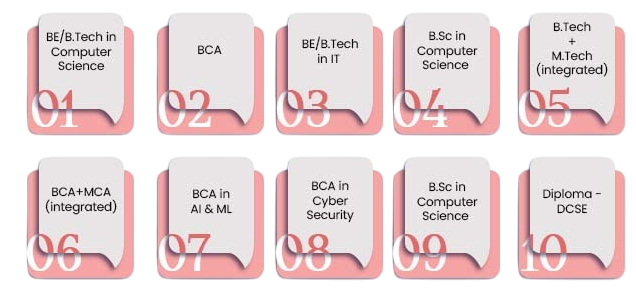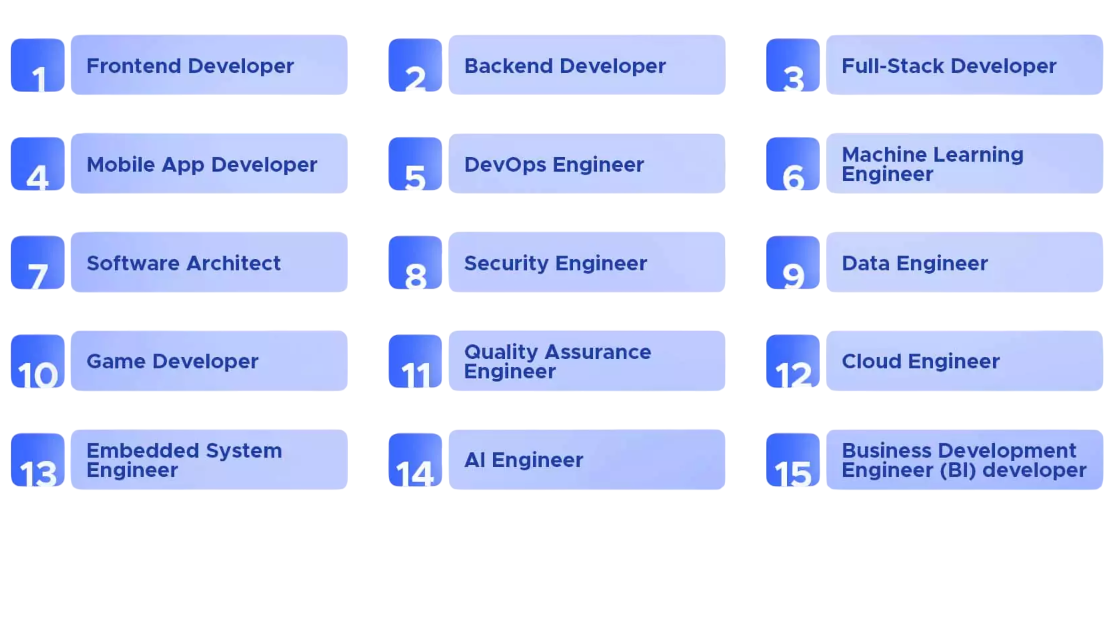
- Software Engineering Degrees/Diplomas After 12th
- Bachelor’s Degree Programs
- Diploma in Software Engineering
- Top Computer Science Courses After Twelfth
- How to Become a Software Engineer After PCM
- How to Become a Software Engineer After PCB
- How to Become a Software Engineer After Arts
- How to Become a Software Engineer After Commerce
- Scope of Software Engineering After Twelfth
- Jobs After Software Engineering
- Conclusion
Software Engineering Degrees/Diplomas After 12th
After finishing class 12th, students who love technology and innovation can select from several Software Engineering courses that provide a solid base for a successful IT career. The most popular option is a Bachelor of Technology (B.Tech) or Bachelor of Engineering (B.E.) in Software Engineering or Computer Science. These four-year programs focus on key areas like programming, software design, database management, algorithms, and web development. To complement this academic foundation with hands-on coding experience, explore Python Training a practical course that helps learners master scripting, automation, data analysis, and web development using one of the most versatile programming languages in the industry. Admission usually depends on entrance exams such as JEE Main or state-level engineering tests. For students who want shorter or more hands-on programs, diploma courses in Software Engineering are great options. These courses last between 1 and 3 years and emphasize practical skills in coding, app development, and software testing. Many schools and online platforms also offer certified Software Engineering courses that allow learners to gain industry-relevant knowledge at their own pace.
Bachelor’s Degree Programs
- Bachelor of Technology (B.Tech.) / Bachelor of Engineering (B.E.) in Computer Science: This is a 4-12 month undergraduate program focused on computer science principles. It covers a wide range of topics to provide a solid understanding of computer science. This includes computer architecture, operating systems, databases, networking, and artificial intelligence.
- Bachelor of Science (B.Sc.) in Computer Science: This is a three-year undergraduate program that usually focuses on the fundamentals of computer science and basic programming skills.
- Bachelor of Computer Applications (BCA): This is also a three-year undergraduate degree program that specializes in computer applications and software development.
Interested in Obtaining Your Python Certificate? View The Python Developer Course Offered By ACTE Right Now!
Diploma in Software Engineering
This degree can be completed after the tenth or twelfth grade. Many colleges offer degree programs in India and abroad. It includes skills in areas like full stack development, cyber security, and cloud computing. Admission usually requires tests such as JEE Main, JEE Advanced, SRMJEEE, and GATE. The cost for this degree is around Rs. 1–3 lakh. Some popular fields where you can get a degree include Mobile Application Development, Graphic Designing, and Web Designing & Development. In addition to these, there are many other degree programs available in the market that can help you become a software engineer. To stay aligned with evolving industry demands, explore Latest Technologies in Computer Science a curated guide to emerging domains like AI, blockchain, cloud computing, and cybersecurity that are shaping the future of tech careers. Integrated applications offered by certain institutions combine bachelor’s and master’s degrees. This allows students to earn both qualifications in less time. These combined programs provide a more efficient and thorough educational experience in a shorter period. For example, students can opt for integrated programs like B.Tech. with M.Tech. (five years), B.Tech. with MBA (five years), and many other options are available.
Gain Your Master’s Certification in Python Developer by Enrolling in Our Python Master Program Training Course Now!
Top Computer Science Courses After Twelfth
Popular undergraduate programs in computer science and related fields lay the foundation for diverse roles in software development, data science, and systems architecture. To explore how these academic paths can lead to collaborative, community-driven innovation, check out Careers in Open Source a guide that highlights opportunities in open-source contribution, project leadership, and global tech ecosystems where transparency and shared learning drive progress.
- B.Tech / B.E. in Computer Science and Engineering: Duration: four years. Focus: Programming, Data Structures, Algorithms.
- B.Sc. in Computer Science: Duration: three years. Focus: Theoretical and mathematical foundations of computing. Suitable for students interested in academia or research.
- BCA (Bachelor of Computer Applications): Duration: three years. Focus: Software development, application design, and database management. Ideal for careers in software and IT.
- B.Tech in Artificial Intelligence and Data Science: Duration: four years. Focus: Machine learning, data mining, statistics, and AI applications.
- B.Tech in Cybersecurity: Focuses on network security, ethical hacking, and digital forensics.

How to Become a Software Engineer After PCM
To become a software engineer after studying Physics, Chemistry, and Mathematics (PCM), earn a bachelor’s degree in computer science or software engineering. Learn programming languages like Python, Java, or C++. Understand the basics of computer science and gain practical experience through internships or projects. Specialize in areas such as web development or information technology. To strengthen your programming foundation and apply it across real-world domains, explore Python Training a hands-on course that equips learners with essential coding skills, data handling techniques, and the ability to build scalable applications using one of the most in-demand languages today. Pass important exams like JEE Main or JEE Advanced. These exams provide access to prestigious institutions, such as the Indian Institutes of Technology (IITs) and the National Institutes of Technology (NITs). These institutions will help you become a software engineer at one of the top multinational companies in the world.
Are You Preparing for Python Jobs? Check Out ACTE’s Python Interview Questions and Answers to Boost Your Preparation!
How to Become a Software Engineer After PCB
For college students who studied PCB (Physics, Chemistry, Biology) in twelfth grade, moving to software engineering is possible. However, they need to build a foundation in computer science. To understand how this academic base translates into real-world opportunities, explore Career Options after BCA a strategic guide that outlines diverse roles in software development, data analytics, cybersecurity, and IT services, helping graduates align their skills with industry demands. Students can do this by enrolling in various computer science courses and certifications. This will help them learn the basics, such as programming languages, algorithms, and software development methods. They can specialize in areas like healthcare software and bioinformatics. They can then apply their knowledge to develop innovative software solutions in healthcare or life sciences.
How to Become a Software Engineer After Arts
Students from an arts background can pursue a BCA without having studied math in twelfth grade. To discover how such pathways lead to rewarding roles beyond programming, Explore Non-Coding IT Jobs a practical guide that highlights career options in UI/UX design, technical writing, QA testing, IT support, and other tech-aligned roles that don’t require deep coding expertise.
- A background in math can help with long-term skill development in software engineering.
- You can learn the fundamentals of software engineering through programming courses and projects.
- Individuals can pursue software engineering diplomas after completing tenth grade.
- After getting a relevant degree, students can choose lateral entry into the third year of B.Tech. (CSE) programs.
- This pathway is ideal for those looking to start a career as software engineers after earning a bachelor’s degree.
How to Become a Software Engineer After Commerce
- If you want to shift to software engineering from a commerce background, get a bachelor’s degree in computer science or software engineering.
- Learn programming languages like Python, Java, or C++ to gain practical experience.
- Take part in internships and projects to improve your hands-on skills.
- Think about focusing on areas such as web development or data science.
- Create a strong portfolio that highlights your projects and skills.
- Connect with people in the tech community to build professional relationships.
- Get ready for technical interviews to land entry-level positions in software engineering.
Scope of Software Engineering After Twelfth
The future of software engineering after high school looks bright. Earning a degree in computer science or software engineering can lead to many career options. To explore how a B.Sc background can open doors in tech, analytics, and research, check out Career Options After B.Sc a comprehensive guide that outlines diverse pathways including software development, data science, cybersecurity, and postgraduate specializations tailored to evolving industry demands. The increasing demand for software professionals in various fields, such as IT companies, healthcare, finance, gaming, and more, offers a rewarding career path in software development, web development, app development, cybersecurity, data science, and artificial intelligence.
Jobs After Software Engineering
Here’s a detailed breakdown of various career options for software engineers: from full-stack development and cloud architecture to data science, cybersecurity, and AI engineering. To understand how these roles shape industries and drive innovation, explore The Power of Programmers a strategic guide that highlights the influence of coding professionals in building scalable solutions, solving complex problems, and transforming digital ecosystems across sectors.

- Software Developer/Engineer: Design, build, and maintain software programs, systems, or websites. Responsibilities include coding, debugging, testing, and implementing software solutions using languages like Python, Java, and JavaScript.
- Frontend Developer: Create user interfaces and experiences for websites or apps using HTML, CSS, and JavaScript. Focus on visual elements.
- Backend Developer: Handle server-side operations, database management, and application logic. Work on functional components users don’t directly interact with.
- Full Stack Developer: Skilled in both frontend and backend development. Capable of working across the entire application stack.
- Mobile App Developer: Specialize in creating applications for iOS and Android devices.
- Software Quality Assurance (QA) Engineer: Ensure software quality through test plans, bug identification, and collaboration with development teams.
- AI/Machine Learning Engineer: Develop AI algorithms and machine learning models for applications like recommendation systems, NLP, and image recognition.
- DevOps Engineer: Improve the software development lifecycle by integrating development and IT operations. Focus on automation, deployment, and infrastructure management.
- Data Engineer/Scientist: Analyze large datasets, build data pipelines, and create data-driven solutions using Python, R, and SQL.
Conclusion
In conclusion, the field of software engineering offers many opportunities across different industries. Whether you’re a recent graduate or considering a career change, gaining relevant skills through education, hands-on experience, and ongoing learning is key to success. To build a strong foundation in programming and data-driven problem solving, explore Python Training a comprehensive course designed to equip learners with practical coding skills, automation techniques, and real-world project exposure using one of the most versatile languages in the tech industry. The constantly changing nature of technology ensures a rewarding career path for those passionate about innovation, problem-solving, and creating meaningful solutions in the fast-paced world of software engineering.





